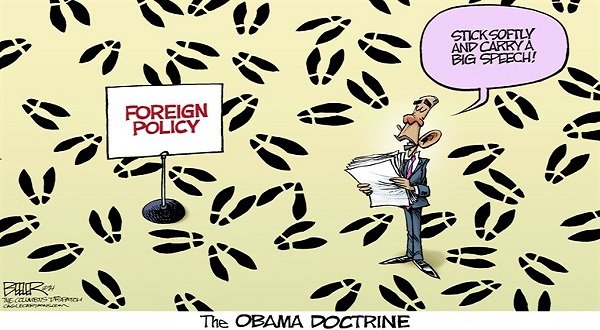Old allies from Saudi Arabia to South Korea and from Japan to Europe want to know why the United States is not out there on point, confronting their adversaries, as we once did
PATRICK BUCHANAN
[dropcap]W[/dropcap]ith his address at West Point, President Obama succeeded where all his previous efforts had failed. He brought us together.
Nobody seems to have liked the speech.
A glance shows that the New York Times and Washington Times, the Financial Times and Washington Post, and the Wall Street Journal were all disappointed with it.
As was said of one of Harding’s addresses, it was “an army of pompous phrases marching across the landscape in search of an idea.”
What Obama has is less a foreign policy doctrine than a foreign policy disposition. He is a reluctant interventionist.
He got us out of Iraq and is taking us out of Afghanistan. Yet he was pushed into a war on Libya that turned out disastrously and is now dipping his toe into what he has called “somebody else’s civil war” in Syria.
Still, Obama’s foreign policy is not going to be judged on what he said, but what he did and failed to do. The same holds for the Beltway hawks, now so harsh on Obama, who once whooped it up for George W. Bush.
Perhaps it is time to review the respective records.
After America backed him in going after al-Qaida after 9/11, Bush, on a triumphal high, invaded Iraq. Soon we were mired in the two longest wars in our history.
America responded by evicting Bush’s party from leadership of both houses of Congress and the White House in 2008.
And what did we miss out on by not electing John McCain?
McCain would have put us into the Russo-Georgian war over South Ossetia. He would have bombed Iran’s nuclear sites. We would still have troops in Iraq. He would have bombed Syria. He would have sent weapons to Kiev to oust the Russians from Crimea and crush the pro-Russian militias in the Donbass. He would be pushing for membership in NATO for Ukraine and Georgia, so the next time there was a dust-up with Putin’s Russia, we could be right in the thick of it.
As for Obama’s foreign policy, while the think tanks and media elite regard it as vacillating and weak, the people who gave him two electoral victories seem generally to approve.
Broadly speaking, Americans are delighted our soldiers are coming home from Iraq and Afghanistan. They were passionately opposed last August to U.S. action in Syria. They dislike Iran, but like that the president is negotiating with Iran.
Thus, whoever persuaded Obama to send TOW antitank missiles to the Syrian rebels and train and arm them may end up responsible for his worst foreign policy blunder.
For we are now extending and broadening a Syrian war that has left 150,000 dead. And we have become de facto allies of both the al-Qaida-linked Al Nusra Front and the more extreme Islamic State of Iraq and Syria, which is carving out a caliphate from Aleppo to Anbar.
President Obama declared years ago that Assad must go.
But has he thought through who rises when Assad falls?
A civil war for power between our rebels and the Islamists would break out. A Sunni-Shia struggle could spread to Lebanon and Iraq.
Reprisals against the Alawite and Christian minorities that backed the Assad family could be horrific.
If so, demands for U.S. intervention would start coming from all quarters: Saudis, Israelis, Turks and pro-Western Syrian rebels.
Obama would be torn between the anti-war country that elected him and the pro-war capital that wants to pivot back to the Middle East.
Another worrisome possibility must be considered.
When President Reagan inserted U. S. Marines into Lebanon’s civil war in 1983, blowback came in the bombing of our embassy and the terrorist attack on the Beirut barracks, killing 241.
Are we not, by sending antitank missiles into a war where Assad is backed by Hezbollah and Iran, inviting terrorist retaliation against us or the Jordanian monarchy that is playing host to U.S. advisers?
There is a reason why Obama has been unable to formulate an Eisenhower Doctrine or a Reagan Doctrine. The nation is divided within itself about where and when we should stand or fight.
Putin’s Russia is not Stalin’s. Xi Jinping’s China is not Mao’s. The 20th century’s ideological struggles between communism, fascism and democracy that produced World War II and the Cold War are over.
Quite naturally, old allies from Saudi Arabia to South Korea and from Japan to Europe want to know why the United States is not out there on point, confronting their adversaries, as we once did.
But the reality is that we are not threatened by Assad in Syria, or by whose flag flies over Crimea or Donetsk, or by who gets custody of the islets in the South or East China Sea.
“Great Britain has lost an empire, but not yet found a role,” said Dean Acheson, also at West Point, half a century ago.
Something similar to that is happening to us.
Obama’s speech simply mirrored our own ambivalence.
All opinions and views expressed in columns and blogs are those of individual writers and do not necessarily reflect the editorial policy of Caravan


